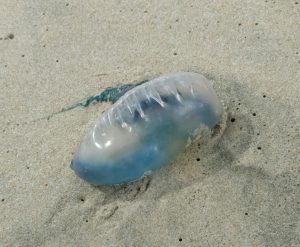
FENWICK ISLAND – Officials in Fenwick Island confirmed a Portuguese man-of-war washed up on the beach this week.
Tim Ferry, captain of the Fenwick Island Beach Patrol, said a Portuguese man-of-war was found in the sand at Houston Street on Wednesday afternoon.
The Portuguese man-of-war is classified as a species of siphonophore with a balloon-like float and tentacles that can grow up to 100 feet, according to the National Oceanic and Atmospheric Administration’s National Ocean Service website.
Ferry said strong currents, tides and above-average water temperatures could play a role in bringing Portuguese men-of-war ashore.
“That sometimes has an effect on all types of sea animals, but it never presents any sort of issue or danger to us,” he said. “In that sense it’s not unusual to see some different types of marine life here or there, whether it be a Portuguese man-of-war or sunfish or some larger fish.”
While not a frequent occurrence, Ferry noted some Portuguese men-of-war have washed up on Delaware beaches in recent years. In July of 2015, for example, the Delaware Department of Natural Resources and Environmental Control (DNREC) issued a press release on Portuguese man-of-war sightings at Delaware Seashore State Park, Fenwick Island State Park and Cape Henlopen State Park.
“It’s not typical for this area of the mid-Atlantic region,” he said. “It’s not a normal, everyday occurrence for us but I would not say that it is rare either.”
Regardless, Ferry said the beach patrol will remain vigilant.
“Because we have had this occurrence, there is a little bit more vigilance as far as monitoring the water area and shoreline and we’ll take whatever action is necessary,” he said.
The Fenwick Island Beach Patrol urged beach-goers who encounter a Portuguese man-of-war to keep their distance and alert a lifeguard.
“Please do not try to touch or handle them,” Ferry said. “Unlike the jellyfish where you can grab the top of it, any type of contact with the man-of-war can cause more serious types of reactions.”
DNREC reported that stings from the Portuguese man-of-war cause pain that lasts up to an hour and leave whip-like red welts on the skin for several days afterward. In rare instances, stings can result in a dangerous, and possibly fatal, allergic reaction.
“They are more dangerous than a regular jellyfish, but we’re not facing an issue where our beaches are being invaded by Portuguese men-of-war …,” Ferry said. “They are highly visible and because of their bloated structure they kind of float a lot easier and get pushed around quickly, making their way up and down the beach. It can be construed as more than one at times.”

